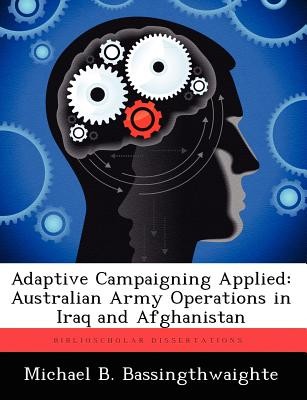
- We will send in 10–14 business days.
- Author: Michael B Bassingthwaighte
- Publisher: BiblioScholar
- ISBN-10: 1249413958
- ISBN-13: 9781249413950
- Format: 18.9 x 24.6 x 0.4 cm, softcover
- Language: English
- SAVE -10% with code: EXTRA
Reviews
Description
The purpose of this study is to evaluate the relevance of Adaptive Campaigning to recent Australian Army operations in Iraq and Afghanistan. The context for Adaptive Campaigning is set by reviewing Australia's way of warfare and the evolution of Australian military thinking over the past decade. The resulting theoretical dialogue in the Australian Army that centered on Complex Warfighting 2004, Adaptive Campaigning 2007 and Adaptive Campaigning 2009 saw the introduction of a novel component -- the theory of complex adaptive systems -- to develop the Australian Army's Future Land Operating Concept. This monograph reviews the theory of complex adaptive systems and its manifestation in Adaptive Campaigning through the execution of simultaneous lines of operation and the Adaption Cycle. It is argued that the nonlinear perspective of complex adaptive systems complements rather than replaces traditional linear processes, such as center of gravity analysis. Two case studies, Overwatch Battle Group (West) 1, Iraq, 2006, and Reconstruction Task Force 3, Afghanistan, 2007-2008, investigate how these forces designed operations in the context of Adaptive Campaigning. In particular, the operational employment of the five lines of operation, the Adaption Cycle, and the translation of a campaign plan into tactical action is analyzed. The study concludes that both forces adapted traditional planning process to cope with the complexity they encountered in ways that were consistent with Adaptive Campaigning. This poses a challenge to existing Australian Joint and Army planning doctrine, which has not yet incorporated the nonlinear perspective of the Future Land Operating Concept. A linear focus on direct force-on-force encounters and an over-reliance on center of gravity analysis may limit the effectiveness of current planning processes in complex operational environments.
EXTRA 10 % discount with code: EXTRA
The promotion ends in 16d.14:54:32
The discount code is valid when purchasing from 10 €. Discounts do not stack.
- Author: Michael B Bassingthwaighte
- Publisher: BiblioScholar
- ISBN-10: 1249413958
- ISBN-13: 9781249413950
- Format: 18.9 x 24.6 x 0.4 cm, softcover
- Language: English English
The purpose of this study is to evaluate the relevance of Adaptive Campaigning to recent Australian Army operations in Iraq and Afghanistan. The context for Adaptive Campaigning is set by reviewing Australia's way of warfare and the evolution of Australian military thinking over the past decade. The resulting theoretical dialogue in the Australian Army that centered on Complex Warfighting 2004, Adaptive Campaigning 2007 and Adaptive Campaigning 2009 saw the introduction of a novel component -- the theory of complex adaptive systems -- to develop the Australian Army's Future Land Operating Concept. This monograph reviews the theory of complex adaptive systems and its manifestation in Adaptive Campaigning through the execution of simultaneous lines of operation and the Adaption Cycle. It is argued that the nonlinear perspective of complex adaptive systems complements rather than replaces traditional linear processes, such as center of gravity analysis. Two case studies, Overwatch Battle Group (West) 1, Iraq, 2006, and Reconstruction Task Force 3, Afghanistan, 2007-2008, investigate how these forces designed operations in the context of Adaptive Campaigning. In particular, the operational employment of the five lines of operation, the Adaption Cycle, and the translation of a campaign plan into tactical action is analyzed. The study concludes that both forces adapted traditional planning process to cope with the complexity they encountered in ways that were consistent with Adaptive Campaigning. This poses a challenge to existing Australian Joint and Army planning doctrine, which has not yet incorporated the nonlinear perspective of the Future Land Operating Concept. A linear focus on direct force-on-force encounters and an over-reliance on center of gravity analysis may limit the effectiveness of current planning processes in complex operational environments.


Reviews